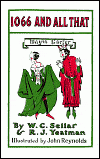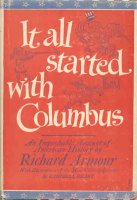

1066 and All That: A Memorable History of England by W. C. Sellar and R. J. Yeatman (Barnes and Noble, 1993, original 1931)
It All Started with Columbus: An Improbable Account of American History by Richard Armour (McGraw-Hill, 1953)
Attention teachers and parents: Next time a child whines, "Why do I have to learn history?" you are free to use my answer. "So you will be able to understand why these books are funny."
They are funny, and clever to boot, but without a solid grounding in history, and some literature as well, you're not likely to get the jokes. As poor as my knowledge of history is, I'm confident I know more about British history than most Americans; even so, a good bit of 1066 and All That left me scratching my head.
It went better with It All Started with Columbus, which does the same thing for American history, a subject on which I am still apallingly ignorant but at least savvy enough to get most of the jokes. It doesn't cover as many years, America having less history than England, but unlike the British book, it gets past World War I. Not much past, however. I wonder if anyone's written a sequel to either of the books.
I think Armour was the better writer, but that may just be the influence of my greater familiarity with his subject. Armour pays homage to his inspiration in the book's dedication:
Humbly dedicated, in an attitude of gratitude, to Walter Carruthers Sellar and Robert Julian Yeatman, who wrote the wonderful 1066 and All That
From 1066 and All That:
The Scots (originally Irish, but by now Scotch) were at this time inhabiting Ireland, having driven the Irish (Picts) out of Scotland; while the Picts (originally Scots) were now Irish (living in brackets) and vice versa. It is essential to keep these distinctions clearly in mind (and verce visa).
From It All Started with Columbus:
[Benjamin Franklin] was self-educated, which means that he was too poor to go to school and therefore got a good education.


